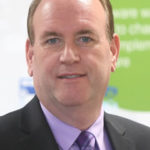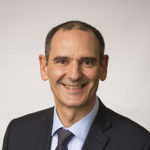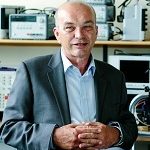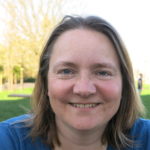

Wednesday 23rd October 2019
2nd IEEE UK & Ireland YP Postgraduate STEM Research Symposium

Prof. Mike Hinchey - IEEE UK & Ireland Section Chair
Lero - The Irish Software Research Centre
Professor Mike Hinchey is Chair of IEEE UK & Ireland Section for 2018-2019. He is President of IFIP, the International Federation for Information Processing (www.ifip.org) and is Emeritus Director of Lero-the Irish Software Research Centre and Professor of Software Engineering at University of Limerick, Ireland. Prior to joining Lero, Professor Hinchey was the Director of the NASA Software Engineering Laboratory. In 2009, he was awarded NASA’s Kerley Award as Innovator of the Year and is recognized in the NASA Inventors Hall of Fame. Professor Hinchey holds a B.Sc. in Computer Systems from University of Limerick, an M.Sc. in Computation from University of Oxford and a PhD in Computer Science from University of Cambridge. Professor Hinchey is a Chartered Engineer, Chartered Engineering Professional, Chartered Mathematician and Charted Information Technology Professional, as well as a Fellow of the IET, British Computer Society and Irish Computer Society. He is Editor-in-Chief of Innovations in Systems and Software Engineering: a NASA Journal and Journal of the Brazilian Computer Society. In January 2018, he became an Honorary Fellow of the Computer Society of India.

Prof. Peter Jimack - Director of the EPSRC Centre for Doctoral Training in Fluid Dynamics
Professor - University of Leeds
Efficient numerical algorithms for the solution of fluid dynamics problems
In this talk I will introduce a number of key concepts that allow fast and efficient computational solution of systems of partial differential equations (PDEs). Such systems are used to model a wide range of physical phenomena, such as fluid flows, phase change problems and fluid-structure interactions.
The concepts that I will describe will include mesh-based schemes such as finite differences and finite elements, adaptive methods, multilevel solvers and parallel algorithms. These will be briefly explained and then their effectiveness across a selection of challenging application problems will be demonstrated.
The presentation will draw upon the work of a number of recent PhD students and collaborations with colleagues across the University.
About the speaker
Peter Jimack is Professor of Scientific Computing in the School of Computing at the University of Leeds. He has worked at Leeds since 1990, when he was initially appointed as a Lecturer in Mathematical Software. He was promoted to Associate Professor in 1997 and to Full Professor in 2003. Between 2010 and 2019 Peter served at the Dean of the Faculty of Engineering including, from 2015 to 2019, as a member of the University Executive. Prior to this he was pro-Dean for Research in the Faculty of Engineering from 2007 to 2010.
Peter’s research is on the development, analysis and application of efficient computational algorithms for the solution of partial differential equations (PDEs), with a particular focus on adaptive, multilevel and parallel algorithms and fluid dynamics applications. Much of this work is multidisciplinary, in collaboration with domain experts in fields as diverse as atmospheric chemistry, earth sciences, mechanical engineering and materials science.
Peter is currently the Director of the EPSRC Centre for Doctoral Training in Fluid Dynamics at Leeds, which has been funded to recruit over 100 PhD students between 2014 and 2023 inclusive. He has personally supervised 30 successful PhD students (with whom he has co-published almost 80 papers) and currently advises 5 others. In recent years he has published papers with international collaborators in Canada, China, France, Pakistan, Saudi Arabia and USA.

Eric Hawthorn - Executive Chairman, Radio Design LTD
Cellular Radio – Business & Technology
Cellular Radio has developed dramatically over the last 30 years. In this presentation I cover my involvement in this fast paced industry, how I started Radio Design Ltd and some of the challenges that must be addressed to enable future evolution.
About the speaker
Eric Hawthorn has been involved in mobile communications R&D and management for over 30 years. Having graduated in 1984, with a BSc (Hons) 1st Class, in Electronic and Electrical Engineering, he has lived and worked in UK, USA and Canada for Plessey, Bell Northern Research (Nortel), M/A-Com and Filtronic. He is now Executive Chairman at Radio Design which he established in Shipley, West Yorkshire in 2007. Eric is a Chartered Engineer, a Fellow of the Royal Society of Engineering and a Fellow of the IET.

Prof. Ian Hunter - Fellow, IET, IEEE and the U.K. Royal Academy of Engineering
Emeritus Professor, School of Electronic and Electrical Engineering
Professor Ian Hunter held the U.K. Royal Academy of Engineering/Radio Design Ltd Research Chair in Microwave Signal Processing at the School of Electronic and Electrical Engineering, University of Leeds, U.K. He is a leading pioneer of theory and design of microwave filters. Professor Hunter is a fellow of the IET, IEEE and the U.K. Royal Academy of Engineering.

Dr Sarah Fores, Associate Faculty, LUBS
Manager of EURO ,The Association of European Operation Research Societies
Sarah Fores was awarded her PhD in Operational Research in the School of Computing, University of Leeds in 1996. She then worked in the School of Computing until 2012. Sarah’s research focused on combinatorial optimisation problems and she contributed to a major piece of optimisation software which is in use in a number of bus companies worldwide. Her knowledge also led to a period of consultancy work with a commercial transport company developing software for bus companies.
Sarah’s teaching mainly focused on discrete optimisation and theoretical computer science. She was the departmental Senior Undergraduate Admissions Tutor for 10 years, responsible for all aspects of student recruitment. She was also the departmental Examinations Officer, responsible for ensuring that University Codes of Practice were adhered to for teaching and assessment. She has acted as the project manager on a successful major grant involving Leeds University, Rolls Royce, and Cybula. She has also contributed to the curriculum design of a joint teaching venture between Southwest Jiaotong University and the Faculty of Engineering.
Currently Sarah is a self-employed consultant undertaking administrative duties as the Manager of EURO – The Association of European Operational Research Societies. She contributes to the organising and programme committees for the major conferences run by EURO which attract over 2000 people but she also helps to facilitate a number of smaller workshops and meetings dedicated to PhD students and people new to the field of Operational Research. Locally she has acted as a STEM Ambassador, presenting talks to local schools on the value of STEM subjects. Sarah has more recently worked in Leeds University Business School as a dissertation supervisor and support lecturer for students on the MSc Business Analytics and Decision Sciences degree programme.
*** All keynotes and workshop speakers will take part in the discussion panel.
